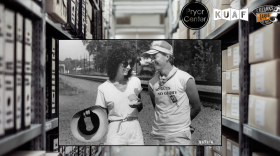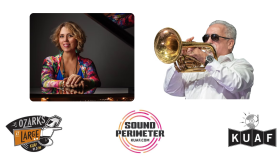KELLAMS: This is Ozarks at Large. I'm Kyle Kellams.
The Symphony of Northwest Arkansas season begins tomorrow night. This season, each subscription concert features a different guest director as SoNA selects a permanent replacement for Paul Haas, who ended his tenure after 15 years.
Lawrence Loh will conduct the first concert, Celestial Visions: Symphonie Fantastique. The program includes the title work by Berlioz as well as Brahms and a relatively new work from Missy Mazzoli.
This week, Loh and SoNA executive director Ben Harris came to the Anthony and Susan Hui News Studio. Harris says this year is a bit different.
HARRIS: Kind of a season of discovery is how we're referring to it as we're looking for our new music director, with all these guest conductors coming in to conduct every concert. It's really exciting. And it's going to be really interesting to see how the orchestra responds to each conductor individually.
KELLAMS: Is this kind of like a job interview?
LOH: Yeah, I mean, it literally is a job interview. But it's not like where you apply and have an interview, and then you either get it or not. This is a very long interview. It started a while ago, and it lasts through this whole season.
Even though I'm the first of the four music director candidates, I will wait until the process is over before I know anything. It's a long process. There are so many interested parties that I overlap with—the musicians, the staff, the board, donors, and the audience. All of them have an opinion and maybe a choice in the outcome at the end of the day.
They may look for some overlapping things and some not overlapping things. So it is a really complex interview process. I don't know if I think about it that way—it's not probably very healthy. But I want to do a good job with the orchestra, put on a great concert, meet as many people as I can, and get to know the area. So it's also me getting to know everything. It's an interview on my side. But I already knew I liked it here and that I liked working with the orchestra based on the last concert. That extra information has been very helpful.
KELLAMS: How did you put the program together?
LOH: We had a series of meetings where I put some proposals together for Ben, and we went through different versions of the same program. There were no soloists, so every program that a music director candidate is leading is basically a variety of three or more pieces meant to show a broad repertoire.
I have three very different pieces on my program, and I think we came to a balanced program within the program and through the whole season. They want the season to be balanced. If everyone has a revolutionary work by a French composer at the end of their program, like me, then it wouldn't be balanced for the audience. So everyone's concert is different in a good way.
HARRIS: It was a really fun process to put all that together and look at all these different pieces that guest conductors wanted to do, then think about how the audience would respond. As Larry said, making sure we had a balanced season.
The conversations with the guest conductors were really fun. We tried to throw them curveballs and say, “I like that you've got this, but maybe not this. What would you do if we wanted to replace this with something else?” That way we could see how quickly they came up with alternative pieces. Through that process, we came up with a really fun and interesting season.
KELLAMS: That fun and interesting season kicks off with a piece by a living composer that's inspired by both the solar system and hurdy-gurdy.
LOH: Yes. Missy Mazzoli's Sinfonia for Orbiting Spheres has two influences. One is literal orbiting solar systems and that circular motion, circular loops, Rococo loops, that are this kind of Baroque style of music but in a 21st century lens.
Then the hurdy-gurdy, this kind of Italian cranking, wheezing instrument. In the concert, the audience will hear instruments like a melodica or harmonicas scattered throughout the orchestra and something emulating this wheezing, unrefined instrument. The juxtaposition of that sound with the beautiful, refined instruments of the orchestra creates a really fun, slightly otherworldly, literally, sound that the audience will immediately be struck by.
It's a great way to start a season because it transports the audience immediately. It puts them in a place they're a little unfamiliar with. This whole season for the audience is exciting because it's a lot of new stuff—literally a new conductor in every program. And I think this starts it off with that in mind.
KELLAMS: With surprise. And then Brahms.
LOH: Yes, the Brahms Haydn Variations. I think that’s one of the pieces I had thought of at the moment. At one point, I had Hindemith's Symphonic Metamorphosis in this spot, but since Berlioz is a longer piece on the second half, the first half can't be that long. Usually a concerto is 25 to 35 minutes long. The Brahms is about 17 to 18 minutes, a good length. It’s a bit more traditionally Romantic.
It's a series of variations and an extraordinary finale based on a theme that may or may not have been written by Haydn, but that Brahms brilliantly transformed. As the orchestra’s social media put it, it's like remixing this theme. I'd never thought of a theme and variations as a remix, but that’s essentially what it is.
You'll hear 10 different styles of this familiar theme. For the audience, it shows the way I can handle different styles quickly changing and encapsulating each variation as its own thing while connecting them. It's a fun piece. I love conducting it and I'm glad it's on the program.
KELLAMS: This makes so much sense because now the Brahms sounds like a link between the first piece and the Berlioz. They all kind of have a similar exploration about them.
LOH: Exactly. We think of Brahms as the successor to Beethoven. We think of Berlioz as a great admirer of Beethoven. Brahms is the symphonist we revere, but at this time he hadn't even written his first symphony. He had written serenades and a piano concerto, and this is mature work, but this was before his symphonies.
He wrote his first symphony in his 40s because he respected the medium so much he didn't want to write the wrong one first. For a composer like Brahms, we don’t think of him as a late bloomer, but he respected this medium so much that he didn’t want to write the wrong one.
So this is like a mature experiment, and it links to Berlioz, who saw himself like Beethoven as a revolutionary composer. To write a work still considered extremely modern now is extraordinary. I couldn’t be more excited to conduct the Berlioz.
KELLAMS: Lawrence Loh is the guest conductor for Saturday night's season opener for the Symphony of Northwest Arkansas at Walton Arts Center.
Ozarks at Large transcripts are created on a rush deadline. Copy editors utilize AI tools to review work. KUAF does not publish content created by AI. Please reach out to kuafinfo@uark.edu to report an issue. The audio version is the authoritative record of KUAF programming.








